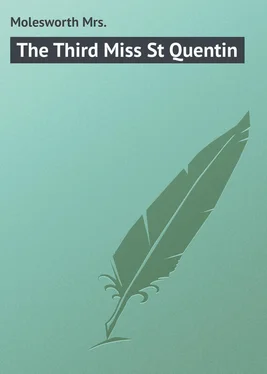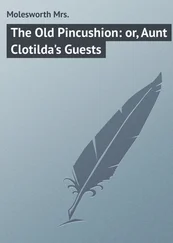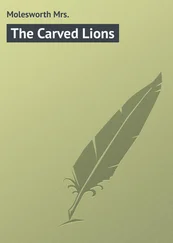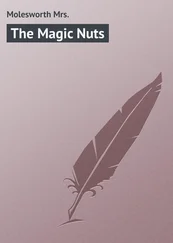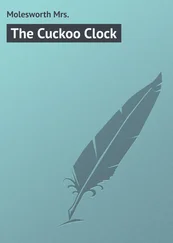Mrs. Molesworth - The Third Miss St Quentin
Здесь есть возможность читать онлайн «Mrs. Molesworth - The Third Miss St Quentin» — ознакомительный отрывок электронной книги совершенно бесплатно, а после прочтения отрывка купить полную версию. В некоторых случаях можно слушать аудио, скачать через торрент в формате fb2 и присутствует краткое содержание. Жанр: foreign_prose, foreign_children, на английском языке. Описание произведения, (предисловие) а так же отзывы посетителей доступны на портале библиотеки ЛибКат.
- Название:The Third Miss St Quentin
- Автор:
- Жанр:
- Год:неизвестен
- ISBN:нет данных
- Рейтинг книги:5 / 5. Голосов: 1
-
Избранное:Добавить в избранное
- Отзывы:
-
Ваша оценка:
- 100
- 1
- 2
- 3
- 4
- 5
The Third Miss St Quentin: краткое содержание, описание и аннотация
Предлагаем к чтению аннотацию, описание, краткое содержание или предисловие (зависит от того, что написал сам автор книги «The Third Miss St Quentin»). Если вы не нашли необходимую информацию о книге — напишите в комментариях, мы постараемся отыскать её.
The Third Miss St Quentin — читать онлайн ознакомительный отрывок
Ниже представлен текст книги, разбитый по страницам. Система сохранения места последней прочитанной страницы, позволяет с удобством читать онлайн бесплатно книгу «The Third Miss St Quentin», без необходимости каждый раз заново искать на чём Вы остановились. Поставьте закладку, и сможете в любой момент перейти на страницу, на которой закончили чтение.
Интервал:
Закладка:
“I shall like her the best,” she rapidly decided, for she was much given to rapid decisions.
“You have quite taken us by surprise, Ella,” said Ermine, in a tone which told nothing. The truth was that she was on the look-out for some sign or signal from Madelene as to what was the meaning of this sudden invasion and in what spirit it was to be met. For though they were not absolutely free from small differences of opinion in private, the mutual understanding and confidence existing between the sisters were thorough and complete, and even had this not been the case, they would never have allowed any outsider to suspect it.
Madelene caught and rightly interpreted Ermine’s unspoken inquiry.
“Ella has thought it right,” she began in a somewhat constrained tone, “to come home sooner than was arranged, on – on account of annoyances which she has been exposed to at Mrs Robertson’s and – ”
”‘Annoyances,’” flashed out Ella, thereby giving Ermine her first glimpse of the fieriness of which Madelene had already in the last quarter of an hour seen a good many sparks, ”‘annoyances,’ do you call them? I think that is a very mild term for unendurable, unbearable insult, and – ”
“Ella,” said Madelene quietly, “you have told me quite as much as I want to hear at present. Papa will be home soon and then you can see what he says. In the meantime it seems to me very much better to drop the subject – it would only leave a painful association with the beginning of your life here to do nothing but uselessly discuss disagreeables. The thing is done – you have left your aunt’s and you are now with us. Neither Ermine nor I need to say anything about it and it is probably much better that we should not.”
“Very well,” said Ella, with as near an approach to sullenness in her tone, as such an essentially un-sullen person could be capable of. “I don’t like it, but I don’t want you to think me ill-natured or quarrelsome when I know I am neither, so I’ll give in. But all the same I feel that you blame me and disapprove of me, and I hate to feel that.”
She glanced up with a slight suspicious dewiness in her lovely brown eyes.
“Poor little thing,” murmured Ermine half under her breath, but a glance from Madelene restrained her. “I know how she means, Maddie,” she said aloud, “I hate the feeling of unexpressed blame or disapproval more than the worst scolding spoken out to me.”
“But there is no question of either, just now,” said Madelene smiling a little. “I did tell Ella openly what I thought, but she did not agree with me, and so I don’t see that there’s the least use in saying more. Do let us get into the shade – and I am sure Ella is longing for some tea.”
“It is all ready,” said Ermine, leading the way to the table under the trees, as she spoke. “I had some fresh made.”
“And Philip?” asked Madelene with the very slightest possible touch of hesitation.
“He is gone,” said Ermine. “He left immediately after you went in.”
“I thought perhaps he would have stayed after all,” she said vaguely.
Ella listened, not without curiosity.
“Who is Philip?” she had it on the end of her tongue to say, but she hesitated. “If they wanted to make me feel at home — one of them ,” she said to herself, “they would have begun telling me all about everybody and everything, and if they don’t choose to tell I don’t choose to ask. ‘Philip,’ I remember something about some one of the name in a dreamy way. And just now in the house Madelene spoke of a cousin – ‘our cousin,’ I think she said. Well I suppose he is my cousin too, and if so, I can’t but hear about him before long, without asking.”
One question however occurred to her as a perfectly natural and permissible one.
“Is my godmother, Lady Cheynes, at home just now?” she asked abruptly.
Madelene looked a little surprised.
”‘My godmother,’” she repeated to herself inwardly, “what a queer way of speaking of our aunt! Of course it is only because she is our aunt that she is Ella’s godmother, I remember her offering to be it ‘just to please poor Ellen,’ as she said. What does Ella want to know for? Perhaps she is thinking of making a descent upon Cheynesacre if she doesn’t find things to her mind here! I suppose our mention of Philip put it in her head.”
Ella repeated her question in another form.
“Lady Cheynes lives near here, does she not? and she is my godmother,” she said with a touch of asperity, as much as she dared show to Madelene, for there was something in Miss St Quentin’s calm, self-contained manner which awed even while it irritated her younger sister.
“Yes,” Madelene replied. “She lives at Cheynesacre, which is about five miles from here. But she is our aunt.”
“Oh,” said Ella, looking a little mystified, “then should I call her aunt? When I have written to her I have always said ‘godmother.’”
“She is not your aunt,” said Madelene gently. “Unless she particularly wished it, I should think it best for you just to call her by her name.”
Ella grew crimson.
“Another snub,” she said to herself.
“She is really our great-aunt,” Ermine said quickly, as if divining Ella’s feelings. “She was our mother’s aunt, and her grandson, Sir Philip Cheynes, is, therefore, only papa’s first cousin once removed. But he always calls papa uncle.”
“Oh,” said Ella. “Of course,” she went on bitterly, “I can’t be expected to understand all the family connections, considering I have been brought up a stranger even to my father. I suppose Colonel St Quentin is my father,” she went on sarcastically, “but I begin to feel a little doubtful even about that.”
“Ella,” said Ermine, “what do you mean? You must not take that tone. You are vexing and hurting Madelene,” for Miss St Quentin’s face was pale and her lips quivering, “and I can just tell you, my dear child, now at once, at the first start, that I won’t have Madelene vexed or hurt. You are a foolish baby, otherwise – ”
Ella’s crimson had turned to something still fierier by this, and her eyes were literally gleaming. She controlled herself for a moment or two to the extent of not speaking, but she lost no time in mentally retracting her decision that she “would like Ermine the best.” It was, perhaps, fortunate that at that moment Barnes reappeared upon the scene. He was not in the habit of so much condescension, but for once dignity had yielded to curiosity. Barnes was dying to have another look at the new arrival, and to be able to judge how things were going to turn out. So he seized the excuse of his master’s dog-cart being seen approaching to betake himself again to the lawn.
“If you please, ma’am,” he began, hesitating when he had got so far, partly because he did not feel quite at ease under Miss Ermine’s rather sharp glance, and partly because he was conscious of being rather out of breath —
“Well, Barnes?” said Madelene coldly.
“I thought you would like to know, ma’am, that the colonel will be here directly. James has just seen the dog-cart at the mile-end turn.”
This was a land-mark visible by experienced eyes from Coombesthorpe gates, though at some considerable distance.
“Very well. Thank you, Barnes. You can tell my father he will find me in the library. I should like to see him as soon as he comes in,” said Madelene composedly, and Barnes retired, very little the wiser for his expedition, though Ella’s burning cheeks had not been altogether lost upon him, and he gave it as his private opinion to the housekeeper that less peaceful times were in store for “his” young ladies than hitherto.
Читать дальшеИнтервал:
Закладка:
Похожие книги на «The Third Miss St Quentin»
Представляем Вашему вниманию похожие книги на «The Third Miss St Quentin» списком для выбора. Мы отобрали схожую по названию и смыслу литературу в надежде предоставить читателям больше вариантов отыскать новые, интересные, ещё непрочитанные произведения.
Обсуждение, отзывы о книге «The Third Miss St Quentin» и просто собственные мнения читателей. Оставьте ваши комментарии, напишите, что Вы думаете о произведении, его смысле или главных героях. Укажите что конкретно понравилось, а что нет, и почему Вы так считаете.
